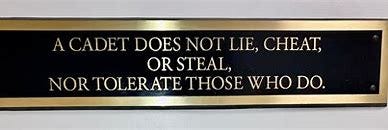For three and a half years, multiple times a day, I would pass a sign in the Sallyport of our barracks. During my freshman year, knob year as it is affectionately termed, this sign was imprinted in our minds and grafted onto our souls.
The sign was the same for every barracks, the saying the same for every cadet, the meaning crystal clear…
It’s the honor code at the Citadel. If you’re caught breaking the code, then you risked punishment, up to and including expulsion. This was what we lived by, well, that and learning how to quibble and nip at the edges of the code without breaking it entirely.
People found ways around the code, myself included. It made lawyers of all of us, learning to walk the razor’s edge of lying, cheating, and stealing. The latter two were easy to avoid, you didn’t cheat in class, on the field, or otherwise. You didn’t steal from one another or anyone for that matter.
Even when we were not in school, we were expected to follow the honor code, because if we broke it on break or during the summer, you could come back and be brought up on charges. The easiest one to quibble with was the lying.
After all, what is truth? What is the data we choose to orient ourselves to the world around us and how can perspective provide enough truth to convince ourselves we’re not lying?
I’ll come back to this in a moment. First, we need to complete the sentence. You see, it wasn’t enough that we were held to an ethic devoid of lying, cheating, and stealing. We were also held to the ethic that we weren’t to tolerate others who did these same acts. We were to police one another and hold one another to the standard set forth by the honor code.
It’s been over thirty years since these daily reminders we were called to uphold. Yet, for the last few weeks, my mind has wandered back to that phrase over and over again.
A cadet does not lie, cheat, or steal, nor tolerate those who do…
I don’t quite know what to make of these intrusive reminders. I’ve been thinking about why this has resurfaced after all these years.
Maybe it has to do with the political situation and the overwhelming Republican ideology of my former classmates…
Maybe it has to do with raising kids to do the right thing regardless of circumstance…
Maybe it’s a reminder of days and times when things felt easier or cut and dry…
Maybe it’s a yearning for certainty amid chaos…
I’m no longer a cadet, neither are my classmates. We’re 30 years removed from the punishment associated with breaking the honor code. Yet, its memory persists for me, calling up questions, thoughts, ideas, doubts, fears, and hopes.
I’m left with this artifact, an intrusive one if I’m honest (we don’t lie after all). It colors and shades the world, the people I meet, and the things I read. It creates a sense of wariness and weariness that I wish would abate. I read the lies, I hear the quibbles and perspectives, I judge, and I separate (I’m not supposed to tolerate…).
Those folx, many of whom I disagree with vehemently, believe they are honoring the honor code. They would look upon the things I think, write about, and imagine as violations of that same code that bound us together.
Here’s the thing, truth always has an element of perspective. Honesty and lying are not monolithic, they are shaped by our experiences of the world. When we cling to monolithic ideas, we lose sight of the humanity of others, we may even lose sight of our own humanity as well.
As I continue to think about these phrases, I’m drawn to the idea that these three pillars of honor are behaviors, not values. They were taught to us as values, as enduring and absolute. Today, I’m not sure they are.
I think I’ve been lied to, or I’ve been lying to myself all these years. That doesn’t make them less important, but it does provide an opportunity to reflect on how we operate in the world.
In the ensuing 30 years since I graduated from the Citadel, I’ve gotten two Masters degrees and a PhD. I’m a glutton for academic punishment. Looking back, it’s all been in the service of trying to find out what’s true, what’s honorable, what’s meaningful about this life we’re living.
I thought I’d found it at the Citadel with its certainty and stability. Today, I’m convinced that was a lie.
Values must be bigger and more expansive than behaviors to be meaningful. For my behaviors to matter, I have to understand why I wouldn’t lie, cheat, or steal, or better yet who is harmed when I do. Values take something that seems sharp and clear, and fuzzes them up a little bit in order to find what is good rather than what is law.
Behaviors are almost always concerned with self-preservation (ego preservation). We can act for others or with others in mind, but often do so in order to embody the values we hold to be true about the world. Our acts for/with others are attempts at embodying values we hold to be true about the world.
When we act against these values it creates a dissonance within ourselves and increases our distress. A large part of therapy in my mind is identifying our values, expanding what they mean, and exploring how our behaviors support or work against them. Within that work is an exploration of resilience, or how we bounce back when we experience setbacks.
Lying, cheating, and stealing are ultimately behaviors meant to guide our interactions with others and the world around us. The value behind them is guided by the question of what it means to be in healthy, respectful relationships with others.
However, if we never explore the larger expansive values, the behaviors will always support self-preservation. They will be self-serving, incomplete, and devoid of any potential meaning. If these are values, then we set ourselves up as judge and arbiter of what is right and wrong, not what is good and meaningful. We become the center of the moral universe, ready to rightfully judge instead of seeking what is possible.
If you’ve made it this far, thank you. Much of this work is personal, an attempt to reconcile my experiences with what I’ve learned in the ensuing 30 years. It’s also an attempt to move thoughtfully into the gray. That phrase makes me want to judge, in absolute terms, the people who would harm those I love and care about.
It doesn’t absolve them of what they’re saying and doing (responsibility and accountability anyone?). In fact, it fuels my resolve to be in relationship with people who care, show compassion and empathy, and work for justice.
Finding what that looks like beyond behavioral codes is the next step in my ongoing evolution and formation.







I really enjoyed this piece so much. Adding this quote to a list of ones I return to and reflect on. Thank you for writing such thoughtful work.
“Lying, cheating, and stealing are ultimately behaviors meant to guide our interactions with others and the world around us. The value behind them is guided by the question of what it means to be in healthy, respectful relationships with others.”